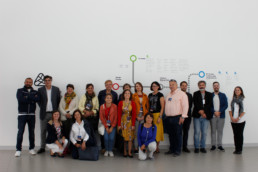Educational InnovationNetwork Key CommunityMembers
Viladecans’ 360º approach to education underpins the idea of an Educational Innovation Network that involves different public and private representatives in a city-wide project. Anybody educates, anywhere at any time. It is understood that learning happens within and out of schools’ walls, and also physically and, increasingly, from and with virtual digital tools.
This education conception makes everybody co-responsible in the teaching-learning process. Bridges between potentially education agents, formal and non-formal, promote collaborative efforts and have a multiplying impact.
With this in view, all ON BOARD partners engaged members from different stakeholders’ groups to participate in the international gatherings, their local planning meetings and in pilot innovative projects.
Teachers and headmasters were obviously the first ones, but other followed: local businesses and the university, entities of all kinds, families, the students themselves… they turned to have a high potential and interest in connecting with each other to improve students’ interest, skills and capacities from a “real world” standpoint and beyond the formal curricula.
Local business are alsoeducating agents
In the holistic 360º vision of education, private and public agents contribute to improve the learning experience and the education success of today’s young people -as well as tomorrow’s community leaders. Some skills and competences such as critical thinking, problem solving, creativity, communication, collaboration… are not explicitly addressed through the formal curricula in schools. Still, they are key to adapt to today’s trends in work and rapidly changing environments in life.
At the ON BOARD Network meeting in Albergaria, project partners put the focus on the private sector, mainly, local companies, and how they can help the local education system advance quality and meaningful education and skills that are suitable for the local labour market and job needs. Tech and innovation, start-ups, local commerce, social enterprises… they can all benefit from a close cooperation with education centres (most commonly secondary and vocational) and provide their own views on what is required in terms of skills and capacities in different economic sectors.
Putting together teachers and local business representatives for collaborative projects can increase the chances for closing the gap between the school learning and the skills required. Project initiatives such as mentoring students, guiding session on careers and job opportunities, testing technological devices in the classroom, or hosting teachers for a period are but some of the proposals that ON BOARD cities shared at the meeting in Albergaria.

Voices
NMB_31
NMB_32
The content of the Website reflects only the authors view. The Managing Authority and the European Comission are not liable for any use that may be made of the information it contains.

